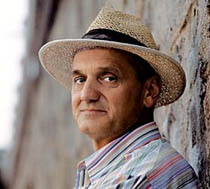
David Vávra - a professional architect and a great dreamer at heart
 |
"I like to drive the same car, go to the same café in the same city at the same time," smiles the famed creator of mischief. Occasionally, he arranges lectures on architecture at the Dobeška Theatre.
His studio creates designs for "square and round" houses, and his reconstructions respect the architecture of past eras. The cubist playful reconstruction of the Švandovo Theatre is well known. He transformed a formaldehyde shack into the original summer house Vendula for the recreational facility of prison guards in Horní Bezděkov. He reconstructed churches in Prague-Braník and Modřany, and together with František Skála, he created the interiors of the Akropolis Palace.
His signature can be seen in the interior of the gym U kapitána Nema in Prague 6, the interior of the bar at the Divadlo v Celetné, or the cellar theater Dobeška. He also redesigned the library building in Hradec Králové, opened in spring 2013, from the former Vertex factory.
Vávra considers architecture to be his main interest because "theater has pleasure in it, but also the fleetingness of the moment. Architecture lasts."
The television series Šumná města made him a media star, in which Vávra, in disguise and on various modes of transportation, guides viewers through the modern architecture of towns and villages in Bohemia, Moravia, and Silesia across a total of 66 episodes.
After its conclusion, he began, alongside Radovan Lipus, to focus on the overlooked legacy of Czech architects in the world in the series Šumné stopy. At one time, he also showcased a quirky German course Alles gute in the satirical program Česká soda.
Vávra's spider-like visage can sometimes be seen in the Vinohrady café Kaaba, furnished in the distinctive playful Brussels style, which delights him with its pastel colors and fondness for irregular curves: "I am very close to the cosmic-designed objects of the sixties."
David Vávra's childhood (born March 9, 1957, in Prague) took place during "the flight of the first human into space, Brussels architecture, the first beats of big beat, plastic kittens, and Bakelite design." His father, Zdeněk, was a well-known architect, and David decided to follow in his father's footsteps at the age of four. He is a graduate of the Faculty of Civil Engineering at Czech Technical University and the Academy of Fine Arts in Prague.
In the basement of Vávra's childhood home, the famous theater Sklep was also established, a popular independent theater scene in Prague in the 1980s with poetistic humor and subtle parody, where Vávra's comedic and clown talent was utilized. According to Vávra, Sklep was not so much a theater, but rather a life philosophy that could be summed up in the phrase: Don’t take anything too seriously.
Vávra became a poet "by accident and necessity," out of the need to spice up his hosting presentations. This led to the creation of the collection Oslavné básně with the subtitle Fifteen Ties of David Vávra (1998). He is also a member of the literary association Kvašňák.
The multifaceted artist also participates in the football and hockey team Sklepovští sršáni. "Without sports, I would die," he states. He expresses himself artistically through collages. And acting in the films Kouř, Cesta z města, Kopytem sem, kopytem tam, Mazaný Filip, or Pasti, pasti pastičky.
A sense of humor, playfulness, balanced detachment, and tolerance - these are the main characteristics of Vávra's projects. He can also turn controversial things into positives - for instance, he likes the Žižkov Television Tower because it is, according to him, a three-pole structure on which aliens will one day land.
The English translation is powered by AI tool. Switch to Czech to view the original text source.
0 comments
add comment
Related articles
0
07.03.2022 | Architect David Vávra celebrates 65 years, loyal to his native Dobeška the whole time
0
05.12.2018 | Architectural Ten Commandments by David Vávra
0
18.09.2018 | David Vávra created the cinema facade in Nová Paka in the Brussels style
0
12.12.2017 | David Vávra: Running with Houses - Exhibition at GAB
0
23.06.2017 | Printed Architecture: David Vávra
0
15.03.2017 | David Vávra: Running with Houses - Exhibition Opening and Catalog Launch
0
19.09.2012 | Kolín will build a city gallery according to the design of David Vávra
0
18.04.2012 | The Holubovo Museum by David Vávra will open in an impressive form
0
04.11.2011 | Architect David Vávra will design the reconstruction of the Kutná Hora brewery
0
12.10.2007 | Architect David Vávra loves trains and rides his bike to work
0
08.06.2007 | Třemošnice is waiting for a church designed by actor and architect Vávra
0
07.03.2007 | David Vávra is celebrating his 50th birthday
9
07.03.2007 | Multifunctional David Vávra is enchanted by almost everything












